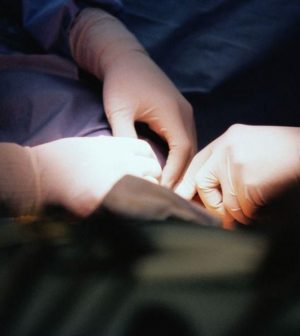- Recognizing the Signs of Hypothyroidism
- 10 Strategies to Overcome Insomnia
- Could Artificial Sweeteners Be Aging the Brain Faster?
- Techniques for Soothing Your Nervous System
- Does the Water in Your House Smell Funny? Here’s Why
- Can a Daily Dose of Apple Cider Vinegar Actually Aid Weight Loss?
- 6 Health Beverages That Can Actually Spike Your Blood Sugar
- Treatment Options for Social Anxiety Disorder
- Understanding the Connection Between Anxiety and Depression
- How Daily Prunes Can Influence Cholesterol and Inflammation
Pre-Surgery COVID Precautions Tied to Worse, Not Better, Patient Outcomes

Surprisingly, patients who isolate before surgery to protect themselves from COVID-19 actually have a higher risk of lung complications after their operation than those who don’t isolate, a new study reports.
The findings conflict with current guidelines that recommend isolation before surgery, researchers noted.
“Our evidence suggests that removing preoperative isolation strategies is unlikely to lead to worse postoperative outcomes for patients, but institutions should monitor their postoperative pulmonary complication rates as strategies evolve,” said study co-author Joana Simoes, a research fellow at the University of Birmingham Global Health Research Unit on Global Surgery in England.
The study analyzed data from more than 96,000 patients in 114 countries, including nearly 27,000 who isolated before surgery.
In all, 1,947 patients (2%) had post-surgery lung complications. Of those, 227 were associated with coronavirus infection.
After adjusting for age, other health problems and type of surgery, researchers concluded that patients who isolated before surgery had a 20% higher risk of lung complications after their operation than those who didn’t isolate.
And the risk rose if patients isolated for more than three days. Isolation of four to seven days was associated with a 25% increased risk, and isolation of eight days or longer with a 31% increased risk.
The researchers also found that patients who isolated before surgery were more likely to live in high-income countries, to be older, and have more respiratory health issues. They were also more likely to be from areas with high SARS-CoV-2 infection rates, according to findings published Aug. 9 in the journal Anaesthesia.
The study was done by the University of Birmingham-led GlobalSurg-COVIDSurg Collaborative. The global partnership of more 15,000 surgeons is gathering a range of data on the COVID-19 pandemic.
There could be several possible reasons for the unexpected findings, according to study co-leader Dr. Aneel Bhangu of the university’s National Institute for Health Research Global Health Research Unit on Global Surgery.
“Isolation may mean that patients reduce their physical activity, have worse nutritional habits and suffer higher levels of anxiety and depression,” he said in a journal news release. “These effects in already vulnerable patients may have contributed to an increased risk of pulmonary complications.”
Bhangu pointed out that there is growing evidence that prehabilitation before surgery improves patient recovery and outcomes. Prehabilitation, or prehab, means a patient is prepared for surgery with physical therapy.
“It is possible that isolation may have, therefore, conversely led to patient deconditioning and functional decline, adversely influencing their outcomes,” Bhangu added.
The researchers pointed out that their study didn’t assess the risk of coronavirus transmission from surgical patients to other patients and hospital staff.
“The benefits of preoperative isolation are not only for the individual patient but also for other patients and staff in hospitals who are at risk from asymptomatic carriers of SARS-CoV-2,” they wrote.
More information
The American College of Surgeons outlines how to prepare for surgery during the COVID-19 pandemic.
SOURCE: Anaesthesia, news release, Aug. 9, 2021
Source: HealthDay
Copyright © 2026 HealthDay. All rights reserved.










